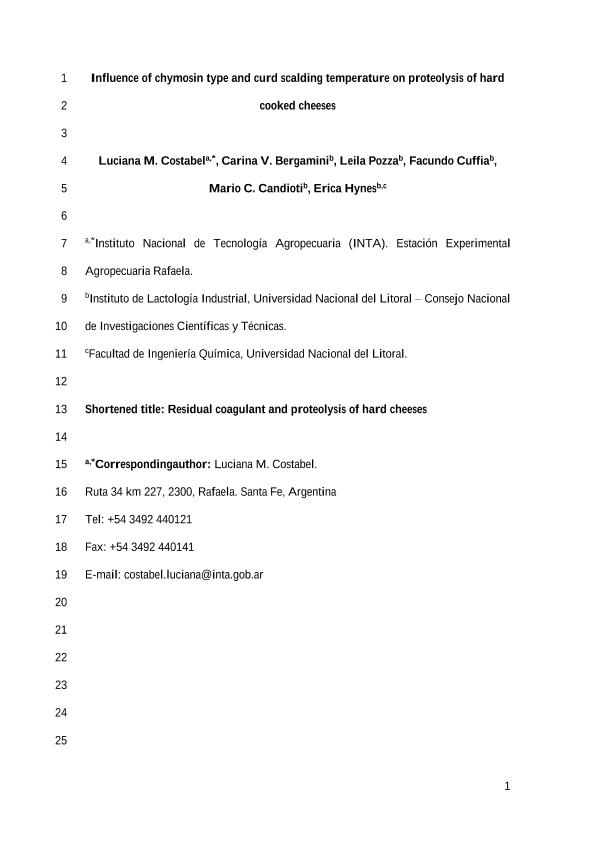Artículo
Influence of chymosin type and curd scalding temperature on proteolysis of hard cooked cheeses
Costabel, Luciana Maria; Bergamini, Carina Viviana ; Pozza, Leila
; Pozza, Leila ; Cuffia, Facundo
; Cuffia, Facundo ; Candioti, Mario César; Hynes, Erica Rut
; Candioti, Mario César; Hynes, Erica Rut
 ; Pozza, Leila
; Pozza, Leila ; Cuffia, Facundo
; Cuffia, Facundo ; Candioti, Mario César; Hynes, Erica Rut
; Candioti, Mario César; Hynes, Erica Rut
Fecha de publicación:
08/2015
Editorial:
Cambridge University Press
Revista:
Journal of Dairy Research
ISSN:
0022-0299
Idioma:
Inglés
Tipo de recurso:
Artículo publicado
Clasificación temática:
Resumen
In this work, we studied the influence of the type of coagulant enzyme and the curd scalding temperature on the proteolysis and residual coagulant and plasmin activities of a cooked cheese, Reggianito, in the interest of reducing ripening time. A two-factor experimental design was applied in two levels: type of coagulant enzyme, bovine chymosin or camel chymosin, and curd scalding temperature, 50 or 56 °C. The experimental treatments were applied in Reggianito cheese making experiments, and the samples were ripened for 90 d at 12 °C. Scalding temperature influenced residual coagulant activity; the cheeses cooked at 50 °C had significantly higher activity than those treated at 56 °C. In contrast, scalding temperature did not modify plasmin activity. Proteolysis was primarily affected by curd cooking temperature because chymosin-mediated hydrolysis of αs1 casein was slower in cheeses treated at 56 °C. Additionally, the nitrogen content in the cheese soluble fractions was consistently lower in the cheeses scalded at 56 °C than those cooked at 50 °C. A significant influence of the type of coagulant enzyme was observed, especially in the nitrogen fractions and peptide profiles, which demonstrated that camel chymosin was slightly less proteolytic; however, these differences were lower than those caused by the scalding temperature.
Archivos asociados
Licencia
Identificadores
Colecciones
Articulos(INLAIN)
Articulos de INST.DE LACTOLOGIA INDUSTRIAL
Articulos de INST.DE LACTOLOGIA INDUSTRIAL
Citación
Costabel, Luciana Maria; Bergamini, Carina Viviana; Pozza, Leila; Cuffia, Facundo; Candioti, Mario César; et al.; Influence of chymosin type and curd scalding temperature on proteolysis of hard cooked cheeses; Cambridge University Press; Journal of Dairy Research; 82; 3; 8-2015; 375-384
Compartir
Altmétricas



